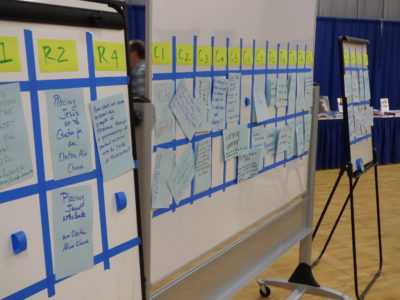I have hosted a lot of Open Space Technology processes. It feels like a hundred ish — I first learned in the early 2000s. I’ve also coached many people to host Open Space. I love the methodology for its minimal structure and process to support immediate self-organized groups of learning and action. I love Open Space as a way of being that encourages organizing around passion and responsibility, freedom and accountability.
Often when I’m coaching, I’ve needed to do it in a very short period of time. I’ve had an hour to work with people over breakfast or lunch. To be clear, I’m glad that OS is simple enough for this to be doable in such a short time. And, to be clear, as a way of being, OS is to be practiced over a lifetime. Nuance comes only with prolonged attention.
Anyway, in that coaching I’ve needed a kind of cheat sheet. Here’s what I used last week.
Context
This is particularly for the person that is the first voice and walks the circle. I encourage them to speak no more than 2-3 minutes. I encourage them to speak in story rather telling reporting data, and that their energy is what people will draft off of. If you are relaxed, it is more likely that participants will respond in a relaxed way. Clarity encourages clarity. As far as what to say, I usually go for either an origin story about Open Space, something that I love about open space and a story connected to that, or a story about the particular theme for that OS. If the theme is about courage, I tell a personal story about needing courage. The last part for this role is to name the core question or theme that is shaping the OS session. I want that question to be in front of participants.
How It Works
It’s important to share an operational description (in 3-4 minutes) so that people know whats happening and what their choices of participation can be. I usually say something about “minimal structure (in the form of a community bulletin board) to put people to work in a self-organized way that is based on passion and interest.” I then show people the papers and markers in the middle of the circle, telling people that we will use these to populate our bulletin board, reminding them that these are spaces and times to meet because they care — not because they all have to be filled. I then describe choice of roles. To convene a group (or groups). To participate in a group. To bumble bee (participate in many groups). To butterfly (tend to self and welcome surprise).
How It Works Well / Contrast to Traditional Styles
These are the basics of OS. They are the special sauce (in 3-4 minutes). I usually talk about them as principles of freedom to help the group be in it’s needed learning, planning, and action. “Whoever comes are the right people.” My favorite reference to this is from Harrison Owen, saying, “I’d rather have three people that care than 50 that don’t give a damn.” “Whatever happens is the only thing that could have.” This is an invitation for people to work with what and who is in front of them — it’s not a bad principle for being adaptive, right. “When it starts is the right time.” This one speaks to the energy of the group meeting. Sometimes it doesn’t get juicy until it’s been going for a while. “When it’s over it’s over.” I usually encourage both the freedom to end when you are done rather than filling space together. And, as my friend Chris Corrigan taught me, “if you are two minutes from world peace, please keep going!” The last is a reference to the “Law of Two Feet or the Law of Mobility” — if you are not learning or contributing, go somewhere than you can.
Sharing Learning
Open Space is about creating a format for good learning and planning to happen. Given that we are not obligating people to be in it, or to go to everything, it is important to create a practice of sharing what happened. Harvest is that. Sometimes through a template or worksheet. Sometimes through a formal collection of notes and action plans. Sometimes through a playful return like a haiku or a limerick. It is an art to create full intention to share, yet not to do it in a boring reports way. Sharing headlines is a real skill. Regardless, people need to know in advance what they are expected to come back with. I usually plan on 1-2 minutes to introduce this.
Back to the Theme
With all of that good description in front of participants, it’s important to come back to the theme, the umbrella under which people are being encouraged to name their important questions — no regretful wishing that you could have talked about your favorite topic but didn’t. I often encourage people to sit for a minute in silence, and then open the market place so that people can create their ideas. How long to give it depends on the size of the group.
Set Up
One more piece. Not everyone wants to be a voice in Open Space. Not everyone needs to. There is some important physical set up also. Creating a grid, or other form in which places and times can be clear. Identifying places to meet with paper and markers. Making posters for the them and for the principles. Creating a harvest template.
That’s it — 10-15 minutes to set the container and then get out of the way so that people can do their work. You’ve opened space. Now your job is to hold the space — it’s not facilitating people’s groups for them. A cheat sheet so as to gain entrance to the lifetime of nuancing.

